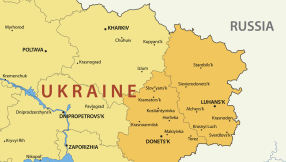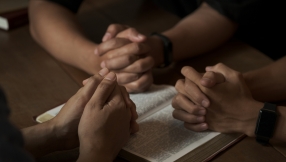A journey to the Holy Land
|PIC1|The Church of England is attempting to revive the flagging numbers of people making pilgrimages to the Holy Land and to engage with the local and often forgotten community of (largely Palestinian) Christians in the Holy Land, known as the "Living Stones".
"I would encourage people to go to the Holy Land for their own faith but even more at this time I would encourage them to go in solidarity with their fellow Christians," says Bishop Michael Doe, General Secretary of USPG: Anglicans in World Mission.
The Bishop recently returned from leading a pilgrimage to the Holy Land along with Richard Llewellin, former Bishop of Dover, Rev Tim Woods and 34 other pilgrims.
Last year at Christmas, the Archbishop of Canterbury visited the Holy land on a pilgrimage with three other church heads and, following that, the Church of England launched an audit which discovered a significant drop in pilgrimages being organised by Church of England parishes and dioceses.
Charles Reed, International Policy Advisor of the Church of England, said, "One of the things that came out through the audit was that the number of people doing pilgrimages has quite significantly declined and as a result of that decline there's now a loss of an institutional capacity to organise pilgrimages."
Reed attributed this to "a general underlying anxiety which people have about travelling to the area".
"If you look at the media images coming out of Israel/Palestine and the wider Middle East then your perception will be that this is a region torn by conflict with violence occurring everyday and in every part," he added.
"But obviously the actual reality of the situation is far from that. That being said, those security concerns need to be taken into consideration."
According to Reed, the perception of violence has meant "that even if people are organising pilgrimages, pilgrims are being forced to cancel or being forced to re-direct their efforts to other parts of the Holy land for example Jordan, Syria and elsewhere".
Although pilgrimages from within Church of England parishes seem to have declined recently, other evidence suggests that pilgrimages as a whole are picking up again.
Raji Khoury of Jerusalem-based Shepherds Tours, said, "In 2000, business was zero, [there was] no business at all. From 2001 to 2003, it started picking up until 2004.
"It was so good until the Lebanese war. It went down lightly as if we started in 2000 again. Now it's picked up, now it's really good in 2007. 2008 is going to be much better. Hopefully nothing will happen in the area. It all depends on what's happening around, if there is fighting or whatever."
Bishop Michael also saw firsthand that the pilgrimage is in no way a dead institution, "I preached in St George's Cathedral [Jerusalem] on the Sunday we were there and there was a decent Arabic speaking congregation.
"But the majority of people in the cathedral on Sunday morning - which was packed - were pilgrims. There were at least four different pilgrimage groups that were in Jerusalem from Britain on that Sunday."
Despite this, Reed's evidence suggests that at least within the Church of England the number of pilgrimages being organised has declined significantly.
In order to promote pilgrimages more, the Archbishop of Canterbury recently announced the introduction of "study tours" to the Holy Land.
The tours, whilst not being actual pilgrimages, are meant to lay the groundwork for future pilgrimages by gathering information and experience on how pilgrimages can be run by churches in a divided and conflict prone area like the Holy Land.
Bishop Michael spoke highly of the personal benefits of the pilgrimage, "I think if you spoke to the pilgrims you would find that for many of them it was indeed a life changing experience and a faith changing experience."
Pilgrimages do "wonderful things for your faith to actually be in the places where Jesus was", he added.
The USPG pilgrimage of nearly 40 people started at the Sea of Galilee, and went on to Nazareth and then Bethlehem before finishing up in Jerusalem.
Nick Kelsey, one of the pilgrims, said of the experience, "I think the highlight for me was the last four days, to discover the city of Jerusalem to see the way its developed over the centuries and then to visit the places where our Lord walked and particularly to follow the stations of the cross up through the old town and out of the old city wall and then into the current Church of the Holy Sepulchre was extraordinary."
Rev Tim Woods, USPG Advocacy Officer and Regional Desk Officer for the Middle East, assisted Bishop Michael in leading the pilgrimage. He described the experience as "an intensive and thoroughly enjoyable and enriching time which probably deepened our faith and touched us in a whole new way".
However, there is another side to the pilgrimage which can easily be overlooked. One thing that the Church and those involved with pilgrimages and study tours seem to be emphasising is that they do not want the Holy Land to become what Reed described as a "religious Disneyland".
The Palestinian Christian community has been in decline in recent years due to strong anti-Christian sentiment.
Says Woods, "The Israeli Government appears to have been actively trying to encourage Palestinian Christians to leave because they have seen them as able to get jobs and so forth elsewhere...they want to occupy more territory and the Palestinian Christian community is more mobile than the Muslim community."
Around 10 per cent of the worldwide Palestinian community is Christian. In the Holy Land, that number drops to only two per cent and often they are among the poorest Palestinians who cannot afford to emigrate.
One of the key things that the Church wants to get across is that pilgrimages should also engage with and benefit the "Living Stones".
Christians are being encouraged to help the local Christian and Palestinian community to organise their pilgrimages in an ethically responsible way by using hotels and tour companies run and owned by Palestinian Christians
Reed said it was important that any financial investment in a pilgrimage should make sure it "feeds back into the local economy and feeds back into nurturing and supporting families there, rather than being kept in bank accounts here in England and in Europe".
As well as an experience to deepen individual faith, however, pilgrimages are an act of love to show solidarity with the often forgotten Living Stones who continue to live and worship in the Holy Land, often in very difficult circumstances.
"The churches are still a significant presence," says Bishop Michael, "but they are under great pressure, hence the need for pilgrimages to go and be seen to support them."













